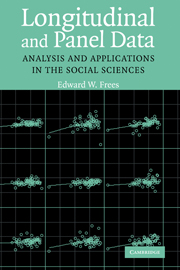Book contents
- Frontmatter
- Contents
- Preface
- 1 Introduction
- 2 Fixed-Effects Models
- 3 Models with Random Effects
- 4 Prediction and Bayesian Inference
- 5 Multilevel Models
- 6 Stochastic Regressors
- 7 Modeling Issues
- 8 Dynamic Models
- 9 Binary Dependent Variables
- 10 Generalized Linear Models
- 11 Categorical Dependent Variables and Survival Models
- Appendix A Elements of Matrix Algebra
- Appendix B Normal Distribution
- Appendix C Likelihood-Based Inference
- Appendix D State Space Model and the Kalman Filter
- Appendix E Symbols and Notation
- Appendix F Selected Longitudinal and Panel Data Sets
- References
- Index
9 - Binary Dependent Variables
Published online by Cambridge University Press: 05 September 2012
- Frontmatter
- Contents
- Preface
- 1 Introduction
- 2 Fixed-Effects Models
- 3 Models with Random Effects
- 4 Prediction and Bayesian Inference
- 5 Multilevel Models
- 6 Stochastic Regressors
- 7 Modeling Issues
- 8 Dynamic Models
- 9 Binary Dependent Variables
- 10 Generalized Linear Models
- 11 Categorical Dependent Variables and Survival Models
- Appendix A Elements of Matrix Algebra
- Appendix B Normal Distribution
- Appendix C Likelihood-Based Inference
- Appendix D State Space Model and the Kalman Filter
- Appendix E Symbols and Notation
- Appendix F Selected Longitudinal and Panel Data Sets
- References
- Index
Summary
Abstract. This chapter considers situations where the response of interest, y, takes on values 0 or 1, a binary dependent variable. To illustrate, one could use y to indicate whether or not a subject possesses an attribute or to indicate a choice made, for example, whether or not a taxpayer employs a professional tax preparer to file income tax returns.
Regression models that describe the behavior of binary dependent variables are more complex than linear regression models. Thus, Section 9.1 reviews basic modeling and inferential techniques without the heterogeneity components (so-called homogeneous models). Sections 9.2 and 9.3 include heterogeneity components by describing random- and fixed-effects models. Section 9.4 introduces a broader class of models known as marginal models, which can be estimated using a moment-based procedure known as generalized estimating equations.
Homogeneous Models
To introduce some of the complexities encountered with binary dependent variables, denote the probability that the response equals 1 by pit = Prob(yit = 1). Then, we may interpret the mean response to be the probability that the response equals 1; that is, Eyit = 0 × Prob(yit = 0) + 1 × Prob(yit = 1) = pit. Further, straightforward calculations show that the variance is related to the mean through the expression Var yit = pit(1 − pit).
- Type
- Chapter
- Information
- Longitudinal and Panel DataAnalysis and Applications in the Social Sciences, pp. 318 - 349Publisher: Cambridge University PressPrint publication year: 2004



